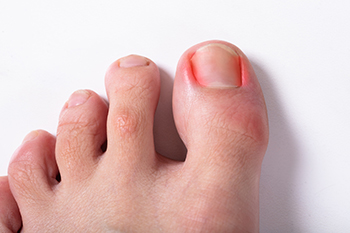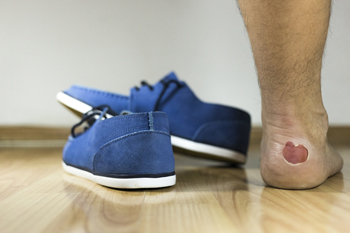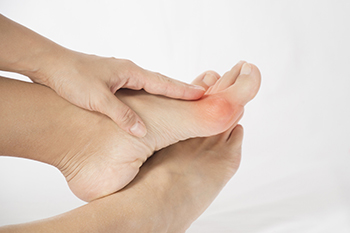December 2022
Decreased Desire to Walk

Those who are among the elderly population are especially at risk of experiencing detrimental afflictions of the feet. There are many reasons for this phenomenon to occur. However, one often overlooked reason is that as individual ages, it is common for them to demonstrate a reduced desire to walk. Walking in a safe and healthy way offers the feet a litany of different benefits. Walking can strengthen muscles in the feet and ensure that they are vibrant, strong, and resilient. However, when elderly individuals lose their desire to walk regularly, they might notice a corresponding decrease in the health of their feet. Of course, walking may not be feasible or safe for all seniors, but walking if you are able and if it is medically permissible can be a key way to improve foot health. Continuing to walk can also increase the balance that one demonstrates when engaging in weight-bearing activities. If you are a senior citizen and want to continue maintaining the strength of your feet, contact a podiatrist today for more details.
Everyday foot care is very important to prevent infection and other foot ailments. If you need your feet checked, contact Dr. Robert Graser from Graser Podiatry and Bunion Surgery Institute. Our doctor can provide the care you need to keep you pain-free and on your feet.
Everyday Foot Care
Often, people take care of their bodies, face and hair more so than they do for their feet. But the feet are a very important aspect of our bodies, and one that we should pay more attention to. Without our feet, we would not be able to perform most daily tasks.
It is best to check your feet regularly to make sure there are no new bruises or cuts that you may not have noticed before. For dry feet, moisturizer can easily be a remedy and can be applied as often as necessary to the affected areas. Wearing shoes that fit well can also help you maintain good foot health, as well as making it easier to walk and do daily activities without the stress or pain of ill-fitting shoes, high heels, or even flip flops. Wearing clean socks with closed shoes is important to ensure that sweat and bacteria do not accumulate within the shoe. Clean socks help to prevent Athlete’s foot, fungi problems, bad odors, and can absorb sweat.
If you have any questions please feel free to contact our office located in Boerne, . We offer the newest diagnostic and treatment technologies for all your foot and ankle needs.
Dealing With an Ingrown Toenail

Sharp pain and redness in a toe where the nail meets the surrounding skin is usually caused by an ingrown toenail. In most cases, this condition is the result of improper trimming of the toenail which often affects the big toe. The sides of the nail can grow into the skin, and it can become red, sore, and painful. Wearing tight or rigid shoes and socks that restrict movement can worsen the pain. Additionally, the pain may increase if the nail becomes infected. If this occurs, it may ooze pus, and it is strongly suggested that you see a podiatrist at your earliest convenience. Depending on the severity of an ingrown toenail, it may be necessary to surgically remove part or all of the toenail. Medication to fight infection will likely be prescribed. Prevention of an ingrown toenail involves cutting the toenails straight across, keeping the feet clean and dry, and wearing shoes that fit properly. For more information on treatment options, please consult a podiatrist.
Ingrown toenails can become painful if they are not treated properly. For more information about ingrown toenails, contact Dr. Robert Graser of Graser Podiatry and Bunion Surgery Institute. Our doctor can provide the care you need to keep you pain-free and on your feet.
Ingrown Toenails
Ingrown toenails occur when a toenail grows sideways into the bed of the nail, causing pain, swelling, and possibly infection.
Causes
- Bacterial infections
- Improper nail cutting such as cutting it too short or not straight across
- Trauma to the toe, such as stubbing, which causes the nail to grow back irregularly
- Ill-fitting shoes that bunch the toes too close together
- Genetic predisposition
Prevention
Because ingrown toenails are not something found outside of shoe-wearing cultures, going barefoot as often as possible will decrease the likeliness of developing ingrown toenails. Wearing proper fitting shoes and using proper cutting techniques will also help decrease your risk of developing ingrown toenails.
Treatment
Ingrown toenails are a very treatable foot condition. In minor cases, soaking the affected area in salt or antibacterial soaps will not only help with the ingrown nail itself, but also help prevent any infections from occurring. In more severe cases, surgery is an option. In either case, speaking to your podiatrist about this condition will help you get a better understanding of specific treatment options that are right for you.
If you have any questions please feel free to contact our office located in Boerne, . We offer the newest diagnostic and treatment technologies for all your foot and ankle needs.
Various Reasons for Blisters to Develop on the Feet

When a blister develops on the feet, it is the body’s natural defense for protecting damaged skin. This can happen as a result of wearing shoes and socks that do not fit correctly, which may cause pressure on different areas of the foot. A blister is a small bubble that is filled with protective fluid. It is important that it is not prematurely popped, and it will gradually drain when the new skin forms and is no longer needed. There are other reasons a blister may form, including having an allergic reaction to an insect bite or chemical substance. Additionally, medical conditions such as eczema, psoriasis, heart conditions, or immune disorders may lead to blisters forming. If you have recurring blisters on the feet, please consult with a podiatrist who can determine the reason why, and offer you methods which may help to prevent blisters in the future.
Blisters may appear as a single bubble or in a cluster. They can cause a lot of pain and may be filled with pus, blood, or watery serum. If your feet are hurting, contact Dr. Robert Graser of Graser Podiatry and Bunion Surgery Institute. Our doctor can provide the care you need to keep you pain-free and on your feet.
Foot Blisters
Foot blisters are often the result of friction. This happens due to the constant rubbing from shoes, which can lead to pain.
What Are Foot Blisters?
A foot blister is a small fluid-filled pocket that forms on the upper-most layer of the skin. Blisters are filled with clear fluid and can lead to blood drainage or pus if the area becomes infected.
Symptoms
(Blister symptoms may vary depending on what is causing them)
- Bubble of skin filled with fluid
- Redness
- Moderate to severe pain
- Itching
Prevention & Treatment
In order to prevent blisters, you should be sure to wear comfortable shoes with socks that cushion your feet and absorb sweat. Breaking a blister open may increase your chances of developing an infection. However, if your blister breaks, you should wash the area with soap and water immediately and then apply a bandage to the affected area. If your blisters cause severe pain it is important that you call your podiatrist right away.
If you have any questions, please feel free to contact our office located in Boerne, . We offer the newest diagnostic and treatment technologies for all your foot care needs.
Dealing With Bunions

A bunion, or hallux valgus, is a deformity that occurs when a bony bump forms at the base of the big toe pushing it outward. From this movement, the tip of the big toe is pulled toward the smaller toes. Activities, including walking and standing, can lead to stiffness, foot pain, swelling, and redness. Calluses may develop where the big toe and the second toe touch or on the ball of the foot. Ill-fitting shoes, that are narrow or tight, or prolonged standing may lead to bunions or make them worse. Bunions can also be a result of one’s foot shape or an underlying condition, such as arthritis. Smaller bunions, also known as bunionettes, can form on the joint of the smaller toe. Bunions most often happen to elderly people and women. One can try bunion pads, better-fitting shoes, or toe spacers to help reduce the pain of bunions. If these things do not work, one can have bunion surgery, or a bunionectomy. If you have a bunion, it is a good idea to visit a podiatrist who can provide the best treatment options for you.
If you are suffering from bunions, contact Dr. Robert Graser of Graser Podiatry and Bunion Surgery Institute. Our doctor can provide the care you need to keep you pain-free and on your feet.
What Is a Bunion?
A bunion is formed of swollen tissue or an enlargement of boney growth, usually located at the base joint of the toe that connects to the foot. The swelling occurs due to the bones in the big toe shifting inward, which impacts the other toes of the foot. This causes the area around the base of the big toe to become inflamed and painful.
Why Do Bunions Form?
Genetics – Susceptibility to bunions are often hereditary
Stress on the feet – Poorly fitted and uncomfortable footwear that places stress on feet, such as heels, can worsen existing bunions
How Are Bunions Diagnosed?
Doctors often perform two tests – blood tests and x-rays – when trying to diagnose bunions, especially in the early stages of development. Blood tests help determine if the foot pain is being caused by something else, such as arthritis, while x-rays provide a clear picture of your bone structure to your doctor.
How Are Bunions Treated?
- Refrain from wearing heels or similar shoes that cause discomfort
- Select wider shoes that can provide more comfort and reduce pain
- Anti-inflammatory and pain management drugs
- Orthotics or foot inserts
- Surgery
If you have any questions, please feel free to contact our office located in Boerne, . We offer the newest diagnostic and treatment technologies for all your foot care needs.
Blog Archives
- July 2024
- June 2024
- May 2024
- April 2024
- March 2024
- February 2024
- January 2024
- December 2023
- November 2023
- October 2023
- September 2023
- August 2023
- July 2023
- June 2023
- May 2023
- April 2023
- March 2023
- February 2023
- January 2023
- December 2022
- November 2022
- October 2022
- September 2022
- August 2022
- July 2022
- June 2022
- May 2022
- April 2022
- March 2022
- February 2022
- January 2022
- December 2021
- November 2021
- October 2021
- September 2021
- August 2021
- July 2021
- June 2021
- May 2021
- April 2021
- March 2021
- February 2021
- January 2021
- December 2020
- November 2020
- October 2020
- September 2020
- August 2020
- July 2020
- June 2020
- May 2020
- April 2020
- March 2020
- February 2020
- January 2020
- December 2019
- November 2019
- October 2019
- September 2019
- August 2019
- July 2019
- June 2019
- May 2019
- April 2019
- March 2019
- February 2019
- January 2019
- December 2018
- November 2018
- October 2018
- September 2018
- August 2018
- July 2018
- June 2018
- May 2018









